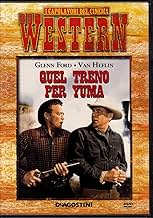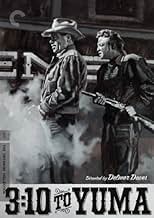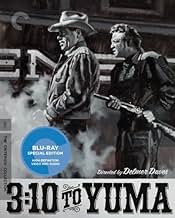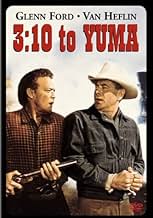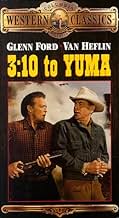L'éleveur Dan Evans est engagé par la compagnie des diligences pour convoyer le dangereux hors-la-loi Ben Wade par le train de 3h10 pour Yuma, mais le reste de son gang tente de le libérer.L'éleveur Dan Evans est engagé par la compagnie des diligences pour convoyer le dangereux hors-la-loi Ben Wade par le train de 3h10 pour Yuma, mais le reste de son gang tente de le libérer.L'éleveur Dan Evans est engagé par la compagnie des diligences pour convoyer le dangereux hors-la-loi Ben Wade par le train de 3h10 pour Yuma, mais le reste de son gang tente de le libérer.
- Nominé pour le prix 1 BAFTA Award
- 1 victoire et 3 nominations au total
- Mrs. Potter
- (uncredited)
- Wade Henchman
- (uncredited)
- Townsman
- (uncredited)
- Wade Henchman
- (uncredited)
- Blacksmith
- (uncredited)
- Mathew Evans
- (uncredited)
- Wade Henchman
- (uncredited)
Avis en vedette
And yes Glenn Ford is so good at being bad, it actually makes you root for him. At least it is true for me. He seems to have some moral compass left ... or some form of humanity. But maybe I'm wrong and he is just deceiving. Whatever the case, he is the star of the movie in so many different ways. If you like western movies with a touch of High Noon to them (a real classic if there ever was one), this will float your boat.
It's only recently that I've begun to concern myself with the Western genre, but '3:10 to Yuma' seems an ideal example. The story's brilliance lies in its own inherent simplicity; the interactions between the two main characters form the picture's emotional core, and it's the incredible depth of these interactions that allow the film to rise above its B-movie foundations. In one case, at least, the minimalism of the film's production allows for the perfect atmosphere in the story's climax, as Wade's bandits begin to surround the hotel room in which their leader is being held. Even before the gang rides into town, the streets have become almost completely vacant; Contention has become a ghost town. It seems likely that this was partly a result of the film's low production budget money spent on extras was probably considered money wasted but the escalating sense of foreboding created by the chillingly empty streets is perfect, as though, indeed, everybody in town figures that "a storm is blowin' up."
Both Glenn Ford and Van Heflin do a very good job considering the film's straightforward plot, and it is their believable characterisations that prove the picture's greatest asset. At first glance, Ben Wade appears obnoxious, sarcastic and detestable, but reveals more likable trait and even a streak of nobility as the film progresses. Likewise, Dan Evans is portrayed as a conservative man {whose logical unwillingness to take risks might easily be misattributed to cowardice}, one who only agrees to escort Wade in order to claim the much-needed $200 reward. However, as the situation continually progresses towards guaranteed disaster, and all the other volunteers back down regretfully, Evans refuses to surrender. In his captor's inflexible perseverance, and unflinching integrity, Wade discovers a man that he himself respects and admires, and the mutual understanding however tentative that the two men develop proves crucial in the picture's final moments.
From the first notes of its mournful, affecting theme to to the poignant finale it draws you in and keeps you riveted as the tension mounts. It accomplishes this by keeping to the Aristotelian unities: a single theme about a single protagonist on a single day. Yes, there is an obvious parallel to **High Noon**.
Though cast as a villain for the only time in his career, Glen Ford's natural likability shines through in the role of gang boss Ben Wade. Van Heflin's Dan Evans is Everyman--no hero but spurred to heroism by desperate circumstances and devotion to family. In contrast to Heflin's homeliness is the godlike physical perfection of the young Richard Jaeckel as the outlaw gang's second-in-command, smart, dangerous, utterly amoral yet loyal unto death to his boss.
There is not a bad performance anywhere. But I must single out Felicia Farr as the lonely barmaid who gives Ford a last, quick good time, and craggy-faced Ford Rainey as a town Marshal with a plan.
With its mix of deep focus shots and closeups of the actors' faces, the cinematography was the obvious inspiration to Sergio Leone in his spaghetti western series.
Some people have commented that the closing scene is unbelievable, but I think that's only true because we never get a fix on Glenn Ford's character. Is he a psychotic killer, or is he a gentleman thief?
The psychotic killer label is supported by his actions in the opening scene of the stage coach robbery. He didn't even try to talk himself out of that situation, even though the driver was one against twelve and couldn't carry out his threat without being gunned down instantly. It's also supported by the fear that his name strikes into the hearts of all the townspeople. A man doesn't generate that kind of fear by simply robbing stage coaches. Obviously, he and his gang have done a lot of killing.
The gentleman thief label is supported by his complete lack of bullying characteristics. In every other situation of the movie except that opening scene, he uses his charm to try to get around people. He doesn't attempt to run roughshod over them. That completely contradicts the image of a guy who shoots first and asks questions later.
As for his gang, they show an extraordinary amount of loyalty to him and each other, which makes the shooting during the stage coach robbery that much more unconvincing. Why would they be loyal to a leader who didn't even try to save one of his own? Maybe that was just an anomaly. Ford tells us later in the movie that his gang will always go to extraordinary lengths to save one of their own, and they do just that to try to free him. Yet, at the end, he chooses to save the life of Van Heflin rather than go with his gang. Okay, so he decided that Van Heflin was a good guy worth saving, even if it did get his second in command killed. I don't mind that. What bothers me is, why is he so confident that, having turned his back on his gang, they are going to try to rescue him again in Yuma??? If I'm in that gang, he's made his choice and he can swing for it.
Le saviez-vous
- AnecdotesAlthough most Westerns by this time were being produced in color, Delmer Daves and Charles Lawton Jr. opted to shoot this one in black and white. Lawton used red filters on his lenses, however, to give the landscape an even more starkly parched look, befitting the story's setting amid a lengthy drought.
- GaffesWhen all the characters are shown in the street just after the clock shows just after 11:00, all of their shadows are extremely long, because the scene was shot probably in very early morning after sunrise.
- Citations
Bisbee Marshal: Do I have two volunteers?
First Posse Member: We gotta know what we're gettin' ourselves into.
Second Posse Member: Sure... might not be safe.
Bisbee Marshal: Safe! Who knows what's safe? I knew a man dropped dead from lookin' at his wife. My own grandmother fought the Indians for sixty years... then choked to death on lemon pie. Do I have two volunteers?
- ConnexionsFeatured in Siskel & Ebert Holiday Gift Guide (1991)
- Bandes originales3:10 to Yuma
by Ned Washington and George Duning
Sung by Frankie Laine
A Columbia Recording Artist
also performed by Norma Zimmer (uncredited)
Meilleurs choix
- How long is 3:10 to Yuma?Propulsé par Alexa
Détails
- Date de sortie
- Pays d’origine
- Langue
- Aussi connu sous le nom de
- 3:10 to Yuma
- Lieux de tournage
- Old Tucson - 201 S. Kinney Road, Tucson, Arizona, États-Unis(Contention City backdrop)
- société de production
- Consultez plus de crédits d'entreprise sur IMDbPro
Box-office
- Brut – États-Unis et Canada
- 4 033 000 $ US
- Durée1 heure 32 minutes
- Couleur
- Rapport de forme
- 1.85 : 1
- 1.75 : 1
Contribuer à cette page








